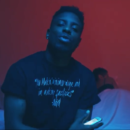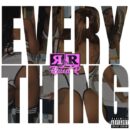If you think ‘grime DJ’, you think Logan Sama. He’s been in the game from the very beginning and hasn’t missed a beat since. From DJing on pirate radio, to hosting a weekly show on Kiss FM for almost a decade, no one knows the grime scene better than Logan. As a natural observer, he has absorbed and analyzed the ins and outs of the genre for 15 years. But what really sets him apart is his inclination and ability to impart these insights with his audience – whether that be during a live set or on the radio; he’s a DJ first and an educator second.
We caught up with him before his first SXSW show at Musicalize Presents: Kano & Friends, during which he played an hour-long set of grime tunes from the noughties to present day, all with a running commentary, weaving in the story of grime between the tracks. This ability to articulate his almost infinite knowledge in an accessible way to people who do and don’t know anything about grime is what has put him at the top of the game. In the backyard of the venue, we spoke to Logan about the importance of consistent content, the changing role of radio for grime and how upcoming DJs can make it big like him.
UHH: Huge pleasure to meet you – thanks for taking the time.
Is this your first visit to SXSW?
Logan Sama: Yeah it is.
Have you done things in the US before?
Yeah, I’ve done a couple of bits.
There’s a lot of British artists who have already come over this year – Little Simz, Dave and AJ Tracey are doing their tour…
What is your expectation of tonight – a grime show at SXSW?
I guess it’s fun, not knowing. I’ve literally just come from Australia where there was not a lot of people who knew the music but they were up for it, so hopefully we’ll get a kind of similar crowd. I know there’s a lot of people from the UK here, whether they’ve travelled from the UK or live / work here, so hopefully there’ll be enough core fans to lift everyone else up. But that’s the point of coming to SXSW, right? You want to introduce new people to grime, so hopefully there’ll be some people who are just trying it out, checking out the sound and wanting to see what the UK has to offer, and we’ll give them a good show as well.
What’s your impression so far of how grime is being received in the US?
It’s very interesting. There’s a lot of influential people obviously talking about the UK in general. I think grime has probably been used as a catch-all for UK-based MC music, because there’s a lot of artists that don’t make grime and are not really part of the grime scene, and are getting lumped in just because they’re British.
Like who?
Little Simz is just a very talented MC, I wouldn’t say she was a grime act. Acts like Giggs and Section Boyz, 67, and even just tracks that aren’t grime tracks. There’s not a barrier or separation but there’s a clear identity to what grime is. I think that just shows you how strong British music is at the moment, where you have the grime scene coming through and doing really well but at the same time, you have people like Dave and Little Simz, that are coming from a different sound and are doing really, really well. So it’s really exciting for me, just as a British person in the music industry, that so many of these artists are being accepted for their wide sound, because there is definitely a noticeable difference in the sound of UK hip hop and grime – and that’s being embraced widely, so it’s a good time.
[soundcloud url="https://api.soundcloud.com/playlists/283891650" params="auto_play=false&hide_related=false&show_comments=true&show_user=true&show_reposts=false&visual=true" width="100%" height="450" iframe="true" /]
What’s your take on the co-sign culture of Drake and Kanye for grime acts?
I think at the moment it does a world of good for the artists, and I just take it as that. They seem to be interested in the sound, more impressed by what we’ve done and what we’ve built, and impressed by the culture, appreciative of it. You don’t really see Drake and Kanye trying to make grime or trying to make the music that they’re co-signing from here. I’ve personally seen the artists benefit from these co-signs, so I think it’s a great thing. And how music is now in general, how most people find music, it’s very important to get those co-signs, whether it’s from an artist that they respect or a media portal that they visit regularly, or a radio station DJ that they check out. People generally work on referral now, so getting those co-signs is really, really helpful for a still growing and burgeoning scene like grime. There’s so much music going on out there for everyone to check out, be it on YouTube, Spotify, SoundCloud, so if your music is being pushed out there by a world-famous rapper or a massive media portal, then that’s great. It means more eyes and ears will be on your sound. For me I’ve only seen positive things, I’ve only seen benefits.
You’ve had a pretty incredible and long career so far – 15 years. I’ve been telling Matt (UHH) as part of his grime education, that if you have any big grime event or party, Logan Sama is your DJ. You’re at the top of your game, at the top of a genre that is growing. You must have had a crazy 2016?
With the explosion of the genre, it actually is one of the only trickle-down economics situations where people do benefit. I’ve seen so many more opportunities because artists are doing well. Because artists are doing well, it means there’s more interest in the music that I’m playing, and it means I have more chances to play that music – better shows, bigger shows. I’ve just done my first tour in Australia, this is the first time I’ve done SXSW, so there’s loads of stuff happening. Recently, I just joined the BBC Radio 1 Residency…
Yes – congratulations! That’s huge. I know you covered for Sian Anderson on 1Xtra before?
Yes I covered for Sian, I was also part of 1Xtra’s 60 Minutes Residency Mix. Now I’m part of the Radio 1 Residency, which just shows you the importance and relevance of grime music right now, that they feel they need to cover that on Radio 1, and that’s great. I’m really enjoying it, it’s a great opportunity to showcase what’s going on and maybe show people a little bit more than they did know, past the obvious star acts. So for me it’s been a really good time it’s been really positive. Every time I see Skepta I thank him, because of all the hard work and everything he’s done, it’s meant that people like myself have had more opportunities to earn money doing a hobby, basically. The same can be said now of Stormzy, and all the artists before and since that have put in that work. The Godfather, Wiley had his first ever Top 10 album recently as well – everyone’s winning basically, it’s great, it’s a wonderful time.
Listen to Logan Sama's 60 Minutes of Grime mix 2015-06-17 (via Mixcloud)
DJ Target used to host a weekly show on 1Xtra called Homegrown championing UK artists, but the show ended recently because the regular playlist now covers so many of those artists, there was no need for a specialist slot. Your current show is monthly – do you see yourself going back to a weekly show, after doing one on Kiss FM for so long?
I did my weekly show on Kiss for 9 and a half years, and there’s real value in a weekly show, it’s really important to just engage. Regular content is so important in this day and age, and I think that’s the real value of a radio show. In the same way that you have these YouTubers that put up content consistently and regularly, that’s the strength of a radio show - continually being heard and promoting, pushing the sound. I think the success of grime over the last 2 and a half years, really does deserve representation on Radio 1 with a proper show. I obviously feel like I would be the best person served to do a weekly grime show for Radio 1, and if they ask me and if the schedule worked out, and it was beneficial for both of us, then yeah I would definitely do it.
Why did you decide to leave Kiss?
I decided to leave Kiss because I felt that the situation had stagnated and it wasn’t really beneficial for me. The station I think felt like they weren’t getting enough out of their specialists. They tried to put a lot of their specialist talent onto their Kiss Fresh digital station, and for me, I didn’t really see enough benefit from that. They offered for me to do a show on Kiss Fresh, I politely declined and did my own thing. Literally within a day of announcing it, I was offered the 60 Minutes slot by Mista Jam on 1Xtra, so straight from one thing to the next and it was a good thing. And obviously the last 2 years I’ve had so much freedom to do other things.
You started out on pirate radio. Do you think grime is at a loss now that mainstream radio is the pervading platform, and that culture has all but gone?
I think how platforms change affect all genres, but how platforms have changed really affected grime heavily in the mid-noughties and towards recent years as well. We lost a lot of venues in London, and even then we had a lot of resistance from the authorities in putting on grime events, it was very difficult. Obviously one of the strengths of grime as you’ll see tonight, is that live performance element, that live energy. At the same time, Ofcom in the UK took down a number of pirate radio stations. So the number of pirate radio stations really reduced, and we were left with platforms like 1Xtra and Choice, which are obviously great platforms but they don’t give you the freedom that pirate does in terms of how to present things. We lost a lot of the breeding grounds for new talent, where they could go and cut their teeth and learn their trade on pirate radio, late at night, or in stage shows in clubs playing to 100 people. You ended up in a time where grime sonically was at a bit of a lost state I think, it didn’t really know what it wanted to be. People were making music aiming towards daytime playlists as opposed to the core sound – and I’m all for experimentation, it’s one of the things I love about the grime, the width of the sound. You have real straight up and down 8-bar loop, lo-fi productions with MCs spitting really aggressive lyrics on. At the same time, you have really expansive soundscapes, where MCs are really going into concepts and talking deep, deep thoughts on the tracks and telling stories, and that all exists under the same umbrella, which is beautiful, and it’s why the music continues to hold my interest to this day. But when you lose a lot of the platforms, you lose that ability to produce talent, and that was a big shame.
It’s one of the things I work hardest on, trying to create new platforms but obviously now with the success of some of the major artists like Skepta and Stormzy, you get more leeway and more opportunities to do things in your own way, and people are more understanding. I think 15+ years down the line of the genre, we have people like yourself, who are in positions of influence, who have grown up with grime, understand the format and the culture of grime, are not put off by it and appreciate the art and beauty and the culture of it, rather than looking down on it and thinking it’s something less than. Right now it’s a great conjoining of opportunities and conditions, in which we have an environment where we’re able to unashamedly do grime as it’s meant to be done and experiment with it, and people can just exist within their own pockets of art and creativity, which is the ideal situation.
Talking of upcoming artists – MCs, DJs, producers – who are you looking out for at the moment?
There’s loads and loads of talent out there from different walks. I think one of the coolest things is the rise of nationwide grime acts. Grime was so London-centric for so long, we’ve seen guys like Bugzy Malone [Manchester] of course do really well, but there’s people from so many strong acts in the Midlands like Jaykae, Safone, Mayhem, Deadly. Guys like Izzie Gibbs, Eyez, Kamakaze in Leicester is good, there’s talent in Bristol – even people in Scotland are making instrumental stuff and showing their MC skills as well, and they’re doing it all in their own accents, bringing their own style to it. That’s what really excites me, because when this shit goes worldwide and people start bringing their international culture to the grime sound, that’s going to be another level of artistry and creativity, and I want to see how people bring their own ethnic influences into the sonics on the instrumentals. I love hearing people use their slang, I think that’s great. Then obviously in London it’s a hot bed of talent, you’ve got AJ Tracey doing really well at the moment, great and exciting young crews like Vision Crew and YGG that are really giving you that raw grime energy that we had ‘01/’02 in the pirate era. You’ve got guys like Big Zuu that are doing really good stuff. I really enjoy Mez, Capo Lee…The thing is, you’ve got guys who started out doing grime maybe 10 years’ ago as real young teenagers, like 14, 15 years old. Now that it’s come back round again and they’ve stuck with it, they’re really getting their chance now; guys like Capo Lee, Jamz – I recently toured Australia with him. Guys in their mid-20s who have been doing grime for a long while, but the scene wasn’t really popping like it is now, and now they’re getting their chance because everyone wants to look for new artists and see what else is in there, and eyes are falling on them.
Of course you’ve got legends as well that have been coming back out, guys like President T who’s been MCing and Skepta was his DJ, you know? Now he’s seen success, he’s brought out a project recently. Guys like Armour are coming back out from the original N.A.S.T.Y Crew. We’ve got Kano and Ghetts here tonight, who were part of N.A.S.T.Y Crew, but Armour was in it before them, so I’m talking about guys who were there really before we had a name for grime. At the same time, you’ve got legends like Wiley and Skepta that have just been so consistent for the last decade plus, and they’re seeing the rewards for it. So like I said, top to bottom, across the full spectrum, there’s something for everybody – it’s a really great time.
I think something that holds back a lot of talented upcoming artists, especially grime artists, is that they don’t know how to market themselves or put themselves out there. You’ve been in the game a long time and you have a very strong brand, complete with your own merch and the Keepin It Grimy banner. How did you learn the importance of a personal brand, and that you weren’t going to get big necessarily on merit alone?
I’ve been a student of the art and the craft of DJs, but I naturally observe things. I’m very good at picking them apart and understanding why they work. Even when I started DJing, most people in grime were literally juggling instrumentals together for MCs, but I looked at other avenues; I looked at David Rodigan who was so instrumental in bringing the culture of reggae to the UK. Tim Westwood again who championed hip hop. If it was wasn’t for Tim Westwood, hip hop definitely wouldn’t have been as big as it was in the UK. And in the States, guys like Kay Slay and Funkmaster Flex, who were really out there as being reporters for what was going on in the scene. I went to pirate radio, and rather than just being a mix DJ, I started presenting and hosting, and trying to report on what was going on, and just being someone who was passionate about the culture and the art of it and trying to convey that to an audience – spread that passion and excitement, because it’s contagious. When you hear someone that’s really excited about something, you can’t help but feel excited yourself. That’s one of the things I’ve learnt from there.
Logan Sama's Keep It Grimey Spotify Playlist
https://open.spotify.com/embed/user/djlogansama/playlist/3GTcAKJ9VFdtptERF3hiNv
I think it’s important to identify your niche, your skillsets, identify what you’re not strong on. When you identify what you’re good at, double-down on that rather than working on filling in the cracks, because you’ll always be chasing things you’re not good at, you know? It’s really important to find out what you’re good at, and go really, really hard at that. If you can do something that no one else is doing as well, then that’s even better because you have a USP. You can always work with people, you can find a team – management, agents, PR – that can cover up for your deficiencies in certain areas, but they can’t boost your abilities, that’s down to you. I would say, if you’re young and up and coming in DJing – this doesn’t just apply to grime – realize what you do on the turn tables is really, really important. But if you want to turn your hobby into a career, you really need to identify and analyze where the opportunities are for revenue streams, why people need to come to you and not anyone else who’s already there. Look at it like that and understand business, because if I was trying to sell you mobile phones, and you’ve already got an iPhone, why are you going to leave Apple? I have to provide an alternative and give you a reason to. Find out what you can do that maybe someone isn’t – if it’s finding new artists, if it’s working with artists in your area and really showcasing them, if it’s putting on showcases and events – do that. Champion a group of artists so that they fuck with you and you represent them and they represent you in turn. Just be consistent with your output, constantly giving people stuff to consume from you. Whether it’s free download mixes, whether it’s showcases, whether it’s social media content, whether it’s playlists that you can compile on websites, whether it’s your own radio show, whether it’s your own club nights, whether it’s mixtapes - it could be an album, you could A&R projects yourself. It’s a rabbit hole you can go down as far as you want. It’s takes creative thinking to create your own space. So I would say that’s my best advice and it’s worked for me over the years.
The Trapstar collaboration is a mad mixtape, it’s almost everyone you want to know in grime on one record. How did you pull that off, it seems like it would be a nightmare?
The guys at Trapstar are always really on the pulse and they love doing creative stuff. They’ve always worked with acts that are emerging, relevant London acts and across the UK before they’re big. Which is great, and they don’t need to because they’re already getting endorsed by Rihanna, and Jay Z and Future and all kinds of big artists. But they understand that firstly, it’s what they love, and secondly that it’s beneficial to still have your roots firmly entrenched in where they’re from. They hit me up directly and said, ‘we want to work on a project.’ I said that I think one of the coolest things to do right now, now that grime is popping, is to put together a project that shows the contemporary acts that are around now, and put them with some real classic grime beats. Anyone that’s discovered Skepta’s ‘That’s Not Me’, or Stormzy’s ‘Shut Up’ – Shut Up is over a decade old, and That’s Not Me was inspired by classic sounds as well. This grime sound is very new to a lot of people’s ears. So if we’re taking old beats, these beats are going to be new to people, because grime doesn’t sound like anything else. So let’s take these classics, take some contemporary MC talent, put them on these beats and get that shit out there.
[soundcloud url="https://api.soundcloud.com/playlists/210568100" params="auto_play=false&hide_related=false&show_comments=true&show_user=true&show_reposts=false&visual=true" width="100%" height="450" iframe="true" /]
I was really happy with how it turned out, we had a really who’s who list of talent, from the young guns to some of the legends. Of course, the icing on the cake was that incredible artwork from Reuben [Dangoor]. That really heralded the UK invasion, ‘the British are coming’, I really love that. I would have liked to have done more to be honest with you, we wanted to do some music videos, we did one, we didn’t get the opportunity to do more. But just musically, creatively, I think that project is incredible. I stand by it and I’m so happy that it reached so many people.
Absolutely. And to finish - what is your favourite song to drop when you’re DJing?
Anything with my name in it.
Always on brand!
Reuben Dangoor – Trapstar x Logan Sama mixtape artwork
![[SXSW Interview] A Short History of Grime with Logan Sama](http://upcominghiphop.net/wp-content/uploads/2017/03/Screen-Shot-2017-03-27-at-10.54.13-AM.png)
Reuben Dangoor – Trapstar x Logan Sama mixtape artwork
Find out more about Logan and listen to him here:
www.logansama.com
Twitter.com/djlogansama
Soundcloud.com/keepinitgrimy
Open.spotify.com/artist/6JO7XiBLDtzFaBwYnP3yPt
Instagram.com/djlogansama
Facebook.com/djlogansama
![[SXSW Interview] A Short History of Grime with Logan Sama](http://upcominghiphop.net/wp-content/uploads/2017/03/IMG_3446-1024x824.jpg)

![[SXSW Interview] A Short History of Grime with Logan Sama](http://upcominghiphop.net/wp-content/uploads/2017/03/IMG_3653-620x420.jpg)
![[SXSW Interview] A Short History of Grime with Logan Sama](http://upcominghiphop.net/wp-content/uploads/2017/03/Screen-Shot-2017-03-27-at-10.51.51-AM.png)
![[SXSW Interview] A Short History of Grime with Logan Sama](http://upcominghiphop.net/wp-content/uploads/2017/03/IMG_3648-683x1024.jpg)

![[Photos From Last Night] Tech n9ne and Stricly Strange Takes Over the Myth in St. Paul](http://upcominghiphop.net/wp-content/uploads/2017/03/tech9-130x130.jpg)
![[Audio] "Panda" Remix - Joyner Lucas](http://upcominghiphop.net/wp-content/uploads/2016/04/Screen-Shot-2016-04-19-at-11.37.29-AM.png)
![[Video] Franky Fade - "So Fine" feat. Tina Aldana](http://upcominghiphop.net/wp-content/uploads/2016/09/Screen-Shot-2016-09-17-at-10.44.16-AM-350x320.png)
![[Video] "Across The Land" - Pharaoh $antana](http://upcominghiphop.net/wp-content/uploads/2015/11/Screen-Shot-2015-11-03-at-4.52.24-PM.png)

![[Mixtape] NWNM2 - Danny Evans](http://upcominghiphop.net/wp-content/uploads/2015/09/Screen-Shot-2015-09-05-at-2.18.16-PM.png)
![[Interview] Part I: TruthCity Takes Everything As Inspiration and Nothing For Granted](http://upcominghiphop.net/wp-content/uploads/2017/03/IMG_2367-130x130.jpg)



